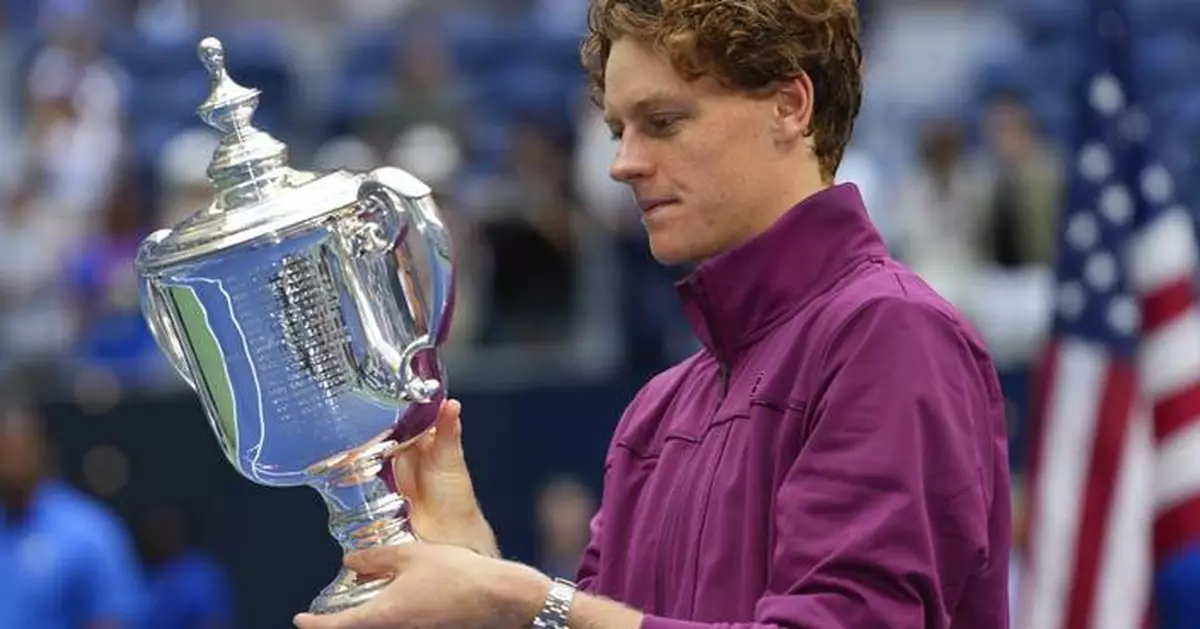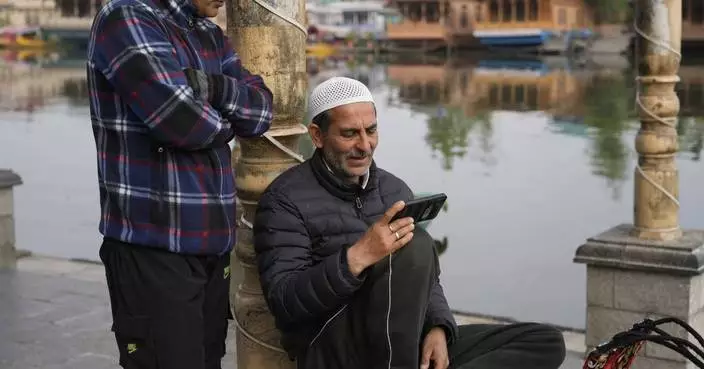ROME (AP) — Time is running out for appeals to be filed in the case that exonerated U.S. Open champion Jannik Sinner from doping.
The World Anti-Doping Agency and Nado Italia, Italy’s anti-doping agency, likely have only a few more days to challenge the decision announced by the International Tennis Integrity Agency on Aug. 20.
Click to Gallery
Jannik Sinner, of Italy, and Taylor Fritz, of the United States, listen to comments during the trophy ceremony after Sinner defeated Fritz in the men's singles final of the U.S. Open tennis championships, Sunday, Sept. 8, 2024, in New York. (AP Photo/Julia Nikhinson)
Jannik Sinner, of Italy, reacts after defeating Taylor Fritz, of the United States, to win the men's singles final of the U.S. Open tennis championships, Sunday, Sept. 8, 2024, in New York. (AP Photo/Julia Nikhinson)
Jannik Sinner, of Italy, reacts after defeating Taylor Fritz, of the United States, to win the men's singles final of the U.S. Open tennis championships, Sunday, Sept. 8, 2024, in New York. (AP Photo/Kirsty Wigglesworth)
Jannik Sinner, of Italy, kisses the championship trophy after defeating Taylor Fritz, of the United States, in the men's singles final of the U.S. Open tennis championships, Sunday, Sept. 8, 2024, in New York. (AP Photo/Seth Wenig)
A pack of Trofodermin, a medical product meant for treating cuts and scrapes, which contains the anabolic steroid Clostebol, a substance listed in the World Anti-Doping Association's banned substances, is seen on the counter of a pharmacy in Rome, Wednesday, Sept. 4, 2024. (AP Photo/Andrew Dampf)
Jannik Sinner, of Italy, holds the championship trophy after defeating Taylor Fritz, of the United States, in the men's singles final of the U.S. Open tennis championships, Sunday, Sept. 8, 2024, in New York. (AP Photo/Kirsty Wigglesworth)
There is a 21-day window to appeal that started when the parties received the decision. Any appeal would be filed to the Switzerland-based Court of Arbitration for Sport.
Sinner tested positive twice for an anabolic steroid in March but was not suspended because the ITIA determined the banned performance-enhancer entered his system unintentionally through a massage from his physiotherapist.
The doping case was kept secret until last month’s announcement and the top-ranked Sinner went on to beat Taylor Fritz in the U.S. Open final on Sunday.
An appeal could jeopardize his U.S. Open title but Sinner and his legal team have provided detailed scientific evidence to show that his explanation is credible.
Sinner said after winning his second Grand Slam title that the months before his case was resolved were not easy.
“It was very difficult for me to enjoy in certain moments,” he said, “so whoever knows me better, they know that something was wrong. But during this tournament, slowly I restarted to feel a little bit more how I am as a person.”
While other players have expressed concern with how Sinner's case was kept secret, WADA and Nado Italia would likely be interested only in the scientific details.
An appeal verdict at CAS could come quickly — even within just a few months — if the parties agree to cooperate. At least that's how it worked in another high-profile doping case in tennis involving Maria Sharapova.
Sharapova tested positive at the Australian Open in January 2016 for the newly-banned heart medication meldonium. She was banned for two years in June that year by the International Tennis Federation.
The Russian star appealed to CAS, had an appeal hearing in New York before three judges that September, and four weeks later got the verdict that cut her ban to 15 months.
The entire process for Sharapova with CAS took just four months — far shorter than most doping cases, which typically last about one year. The timeline can stall with the complexities of picking a judging panel, finding a hearing date and parties exchanging documents and evidence from expert witnesses.
During the Indian Wells hard-court event in March, Sinner tested positive for low levels of a metabolite of Clostebol, a banned anabolic steroid that can be used for ophthalmological and dermatological use. It’s the same drug for which San Diego Padres star Fernando Tatis Jr. was suspended by MLB in 2022.
Sinner tested positive again eight days later in an out-of-competition sample.
He was provisionally suspended twice by the tennis integrity body because of those test results, but he successfully appealed twice to an independent tribunal judge and was allowed to keep competing on tour.
Sinner said his test results happened because his fitness trainer purchased an over-the-counter spray called Trofodermin in Italy that contained Clostebol and gave it to Sinner’s physiotherapist to treat a cut on the physiotherapist’s finger. The physiotherapist then treated Sinner without wearing gloves.
The ITIA said it accepted Sinner’s explanation, after 10 interviews with the player and his entourage, and the independent panel agreed at a hearing on Aug. 15.
Sinner later announced that he had fired his two trainers.
While other players wondered whether Sinner was accorded special treatment, most believed he wasn’t trying to dope.
“You can understand why people are upset about it. In anti-doping, it sounds so ridiculous,” said Travis Tygart, CEO of the U.S. Anti-Doping Agency, which wasn’t involved in the case. “But the science is such that, if the facts are actually proven out, it is actually plausible.”
If Sinner did lose in an appeal case to CAS, he would likely face a maximum ban of two years instead of four. Four-year bans are usually reserved for athletes unable to show their positive doping test was unintentional.
Sinner provided a clear explanation to an independent tribunal in London, which judges cases brought by the tennis integrity body.
Any possible ban would likely be backdated to March.
Neither WADA nor Nado Italia tend to announce appeals, so it would likely be up to CAS to communicate if there is a case brought before the sports court.
In addition, Giovanni Fontana, an Italian lawyer who has worked on about 100 doping cases over 30 years, recently told The Associated Press that Sinner's two trainers could risk a separate inquiry in Italy — pointing to the four-year suspension for a club doctor at an Italian soccer team in 2018 for administering Trofodermin to a player.
Dunbar reported from Geneva. AP National Writer Eddie Pells in Denver and AP Tennis Writer Howard Fendrich in New York contributed to this report.
AP tennis: https://apnews.com/hub/tennis
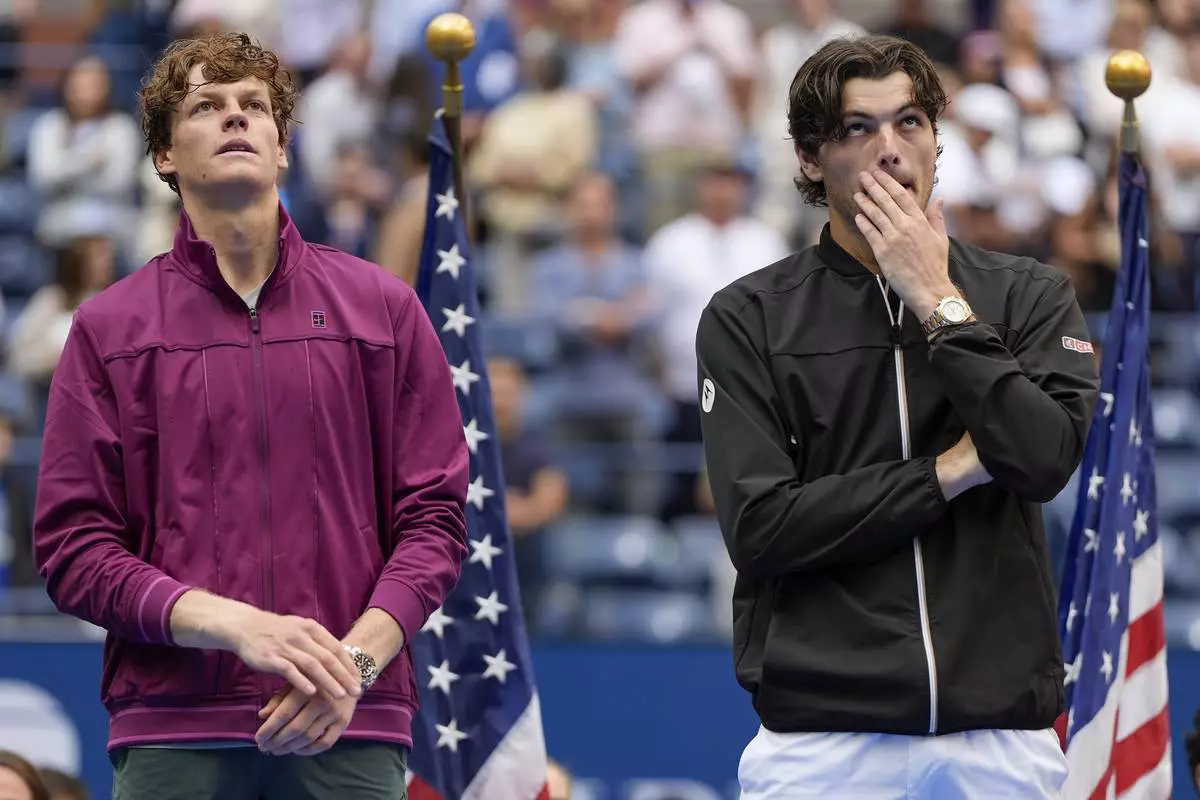
Jannik Sinner, of Italy, and Taylor Fritz, of the United States, listen to comments during the trophy ceremony after Sinner defeated Fritz in the men's singles final of the U.S. Open tennis championships, Sunday, Sept. 8, 2024, in New York. (AP Photo/Julia Nikhinson)

Jannik Sinner, of Italy, reacts after defeating Taylor Fritz, of the United States, to win the men's singles final of the U.S. Open tennis championships, Sunday, Sept. 8, 2024, in New York. (AP Photo/Julia Nikhinson)

Jannik Sinner, of Italy, reacts after defeating Taylor Fritz, of the United States, to win the men's singles final of the U.S. Open tennis championships, Sunday, Sept. 8, 2024, in New York. (AP Photo/Kirsty Wigglesworth)

Jannik Sinner, of Italy, kisses the championship trophy after defeating Taylor Fritz, of the United States, in the men's singles final of the U.S. Open tennis championships, Sunday, Sept. 8, 2024, in New York. (AP Photo/Seth Wenig)
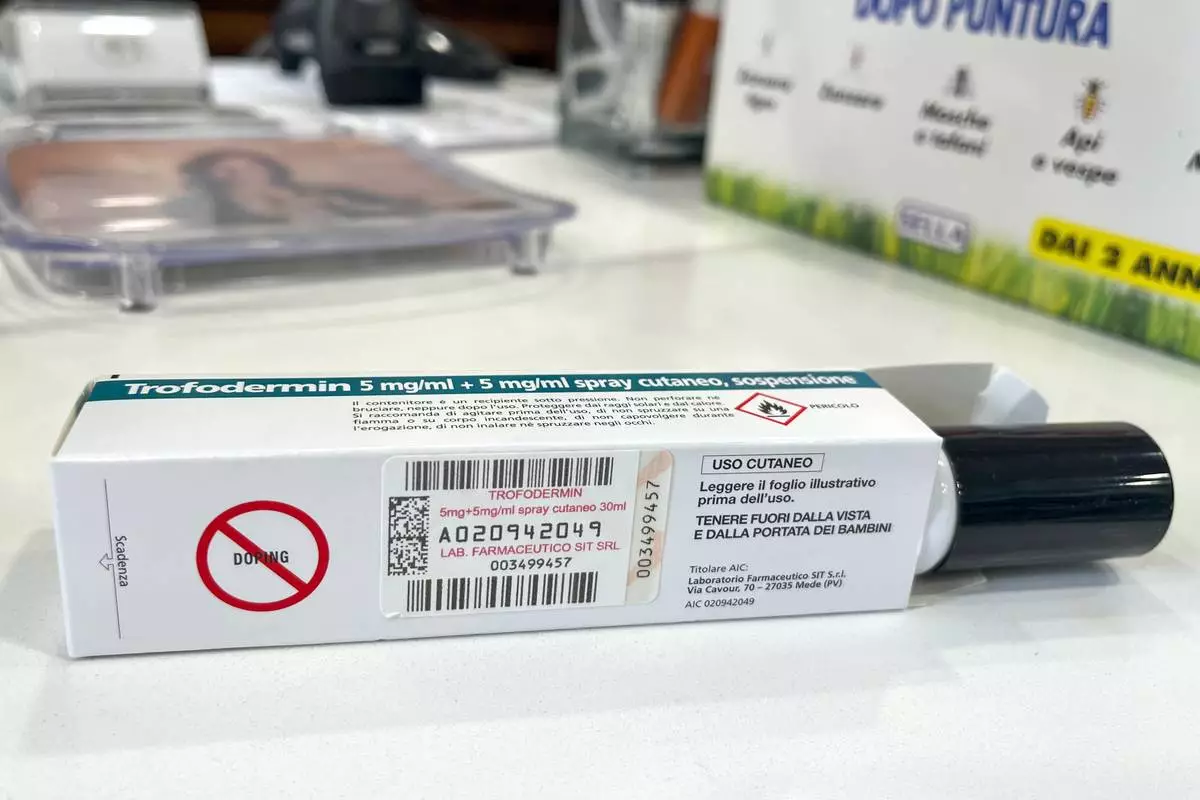
A pack of Trofodermin, a medical product meant for treating cuts and scrapes, which contains the anabolic steroid Clostebol, a substance listed in the World Anti-Doping Association's banned substances, is seen on the counter of a pharmacy in Rome, Wednesday, Sept. 4, 2024. (AP Photo/Andrew Dampf)

Jannik Sinner, of Italy, holds the championship trophy after defeating Taylor Fritz, of the United States, in the men's singles final of the U.S. Open tennis championships, Sunday, Sept. 8, 2024, in New York. (AP Photo/Kirsty Wigglesworth)
KYIV, Ukraine (AP) — Two months ago, following high-level talks between Ukrainian and American delegations in the Saudi city of Jeddah, the United States proposed an unconditional 30-day ceasefire between Russia and Ukraine. Ukrainian President Volodymyr Zelenskyy publicly announced on that same day that Ukraine was ready to accept the proposal, provided Russia did the same.
The Russian leader balked, saying a temporary break in hostilities would only benefit Ukraine and its Western allies by letting them replenish their arsenals. Since then, Russia has continued its military campaign, maintaining attacks along the roughly 1,000-mile (1,600-kilometer) front line and targeting civilian infrastructure. In some cases, it has stepped up its attacks on residential areas with no obvious military targets.
An Associated Press tally based on reports from Ukrainian authorities found at least 117 civilians have been killed and more than 1,000 wounded in Russian aerial attacks since Ukraine announced on March 11 its willingness for a ceasefire — all of them attacks involving long-range drones and a variety of missiles.
The tally does not include casualties caused by short-range weapons, including mortars, multiple launch rocket systems, S-300 and S-400 ballistic missiles, drone-dropped explosives and aerial glide bombs, which Russia continues to use along the front line and nearby areas.
Ukrainian officials do not provide overall casualty figures nor do they release official figures on how many Ukrainian troops have been killed on the battlefield.
Among the deadliest attacks recently was a Russian ballistic missile that struck in the packed center of Sumy in northeast Ukraine on a busy Palm Sunday morning in mid-April. At least 35 people, including two children, were killed and around 120 wounded. Another blasted a playground in Zelenskyy's hometown, killing 20 people including nine children.
A deadly barrage targeting the capital Kyiv prompted rare criticism from President Donald Trump for the Russian leader.
“Not necessary, and very bad timing. Vladimir, STOP!” Trump said in a post on his Truth Social platform.
In the past two months, Putin has twice unilaterally declared a brief ceasefire, one for Easter and the other to mark Victory Day in World War II. Both were repeatedly violated.
Ukraine, meanwhile, has continued to launch droves of drones at Russian regions. This week, Russia’s Victory Day festivities were overshadowed by reports of Ukrainian drone attacks targeting Moscow and triggering severe disruptions at the capital’s airports, as well as cellphone internet outages amid jamming aimed at foiling more potential attacks.
Here’s a look at some of the deadliest attacks by Russian troops targeting Ukraine since March, 11:
March 24: A Russian missile hit a densely populated area of Sumy, damaging 30 residential buildings and a school. Local authorities said 101 people were wounded, including 23 children.
April 3: Russian forces launch Shahed drones at a residential neighborhood in Ukraine’s second largest city of Kharkiv. Regional officials reported five people killed and 34 others wounded. Among the victims was an entire family, including their 12-year-old daughter.
April 4: Russian forces carry out a combined missile and drone attack on a residential area in Kryvyi Rih that blasted a playground. According to local authorities, 20 people were killed, including nine children, and 74 others were wounded. The assault damaged more than 60 apartment buildings and private homes.
April 13: On a busy Palm Sunday morning, a Russian ballistic missile strikes Sumy city center filled with civilians, killing 35 people, including two children, and wounding 119. It was one of the deadliest attacks on Ukrainian civilians this year. The next day, Russia said it targeted a gathering of senior Ukrainian military officers. Putin later admitted it was a “civilian facility” but claimed it hosted an award ceremony for Ukrainian troops.
April 18: Three Russian cluster munitions struck Kharkiv, killing one man and wounding 113 people, including nine children. The strikes that happened during early morning hours could have potentially led to much higher casualty rates if conducted an hour later, city authorities said.
April 24: Russia struck Ukraine's capital Kyiv with an hourslong barrage of missiles and drones. At least 12 people were killed and 90 were hurt in the deadliest assault on the city since last July. In total, Russia launched 145 Shahed drones and 70 missiles in a single night over Ukraine.
April 29: At least 16 Russian Shahed drones struck Kharkiv, wounding 47 people, including two children and a pregnant woman. The city’s mayor reported direct hits on residential buildings and a medical facility.
May 2: Drones targeted at least four districts of Kharkiv city, injuring 47 people. One child was among the wounded.

FILE- A mother cries over the coffin of her son Herman Tripolets, 9, killed by a Russian missile, during a funeral ceremony in Kryvyi Rih, Ukraine, April 7, 2025. (AP Photo/Evgeniy Maloletka, File)
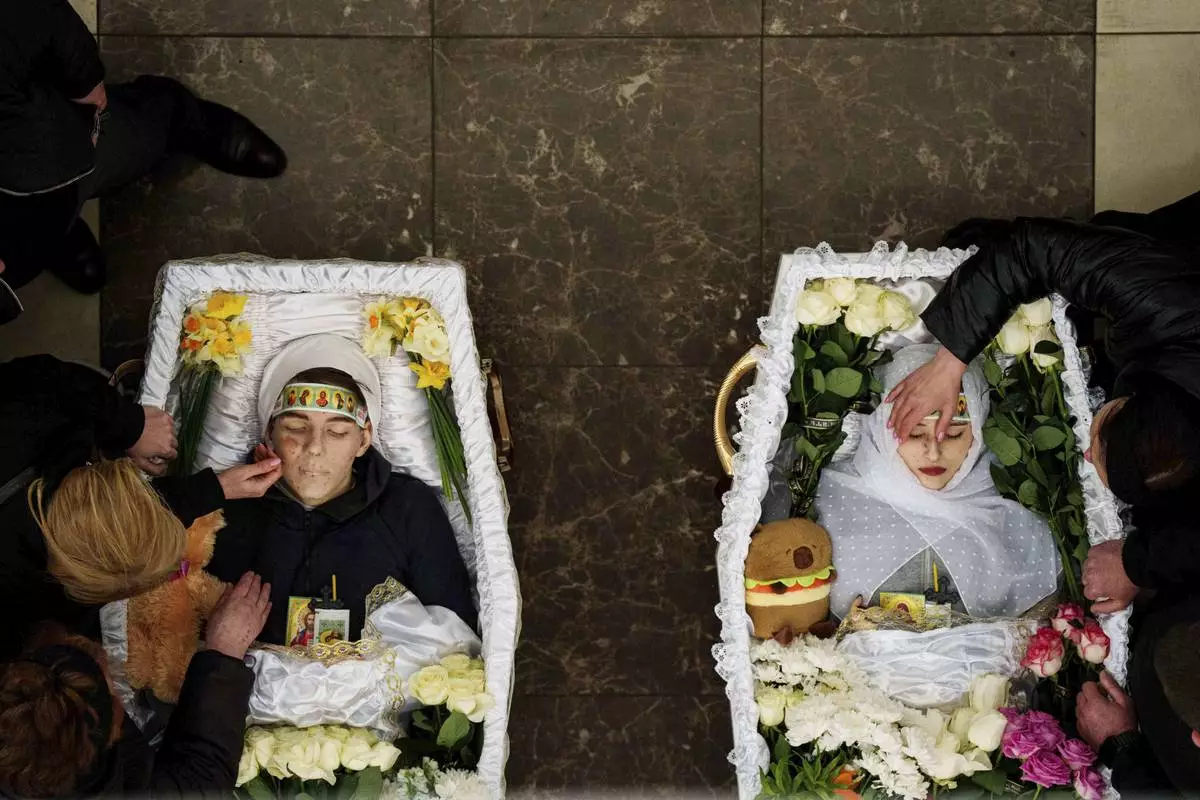
FILE- Mothers cries over the coffins of their children Danylo Nikittskyi, 15, and Alina Kutsenko, 15, killed by a Russian missile, during a funeral ceremony in Kryvyi Rih, Ukraine, April 7, 2025. (AP Photo/Evgeniy Maloletka, File)

FILE= A rescue worker rests near university building destroyed by a Russian missile strike on Sumy, Ukraine, April 13, 2025. (AP Photo/Evgeniy Maloletka, File)

FILE- A mother Anastasia Alekseieva, 31, looks on a wound of her son Vladyslav Alekseiev, 11, both of them were injured by a Russian missile, at the children hospital in Kryvyi Rih, Ukraine, April 8, 2025. (AP Photo/Evgeniy Maloletka, File)

FILE- A man cries at the trolleybus after a Russian missile strike on Sumy, Ukraine, April 13, 2025. (AP Photo/Volodymyr Hordiienko, file)








